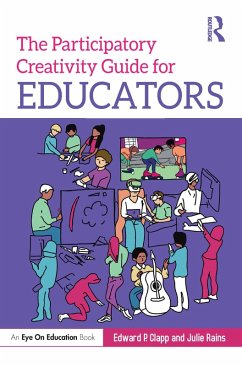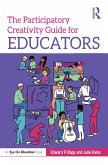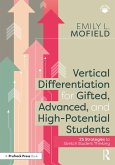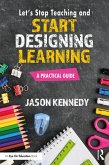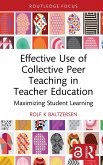26,95 €
26,95 €
inkl. MwSt.
Sofort per Download lieferbar

13 °P sammeln
26,95 €
Als Download kaufen

26,95 €
inkl. MwSt.
Sofort per Download lieferbar

13 °P sammeln
Jetzt verschenken
Alle Infos zum eBook verschenken
26,95 €
inkl. MwSt.
Sofort per Download lieferbar
Alle Infos zum eBook verschenken

13 °P sammeln
- Format: PDF
- Merkliste
- Auf die Merkliste
- Bewerten Bewerten
- Teilen
- Produkt teilen
- Produkterinnerung
- Produkterinnerung

Bitte loggen Sie sich zunächst in Ihr Kundenkonto ein oder registrieren Sie sich bei
bücher.de, um das eBook-Abo tolino select nutzen zu können.
Hier können Sie sich einloggen
Hier können Sie sich einloggen
Sie sind bereits eingeloggt. Klicken Sie auf 2. tolino select Abo, um fortzufahren.

Bitte loggen Sie sich zunächst in Ihr Kundenkonto ein oder registrieren Sie sich bei bücher.de, um das eBook-Abo tolino select nutzen zu können.
Offering an embracing approach to creativity that encompasses invention and innovation, this practical guide reframes creativity as a mode of experience that all young people and adults have the opportunity to participate in.
- Geräte: PC
- mit Kopierschutz
- eBook Hilfe
Andere Kunden interessierten sich auch für
![The Participatory Creativity Guide for Educators (eBook, ePUB) The Participatory Creativity Guide for Educators (eBook, ePUB)]() Edward P. ClappThe Participatory Creativity Guide for Educators (eBook, ePUB)26,95 €
Edward P. ClappThe Participatory Creativity Guide for Educators (eBook, ePUB)26,95 €![Vertical Differentiation for Gifted, Advanced, and High-Potential Students (eBook, PDF) Vertical Differentiation for Gifted, Advanced, and High-Potential Students (eBook, PDF)]() Emily L. MofieldVertical Differentiation for Gifted, Advanced, and High-Potential Students (eBook, PDF)30,95 €
Emily L. MofieldVertical Differentiation for Gifted, Advanced, and High-Potential Students (eBook, PDF)30,95 €![Let's Stop Teaching and Start Designing Learning (eBook, PDF) Let's Stop Teaching and Start Designing Learning (eBook, PDF)]() Jason KennedyLet's Stop Teaching and Start Designing Learning (eBook, PDF)26,95 €
Jason KennedyLet's Stop Teaching and Start Designing Learning (eBook, PDF)26,95 €![Where Is the Teacher? (eBook, PDF) Where Is the Teacher? (eBook, PDF)]() Kyle WagnerWhere Is the Teacher? (eBook, PDF)30,95 €
Kyle WagnerWhere Is the Teacher? (eBook, PDF)30,95 €![Effective Use of Collective Peer Teaching in Teacher Education (eBook, PDF) Effective Use of Collective Peer Teaching in Teacher Education (eBook, PDF)]() Rolf K BaltzersenEffective Use of Collective Peer Teaching in Teacher Education (eBook, PDF)0,00 €
Rolf K BaltzersenEffective Use of Collective Peer Teaching in Teacher Education (eBook, PDF)0,00 €![How to Better Serve Racially, Ethnically, and Linguistically Diverse (RELD) Students in Special Education (eBook, PDF) How to Better Serve Racially, Ethnically, and Linguistically Diverse (RELD) Students in Special Education (eBook, PDF)]() Buruuj TunsillHow to Better Serve Racially, Ethnically, and Linguistically Diverse (RELD) Students in Special Education (eBook, PDF)28,95 €
Buruuj TunsillHow to Better Serve Racially, Ethnically, and Linguistically Diverse (RELD) Students in Special Education (eBook, PDF)28,95 €![Love the Questions (eBook, PDF) Love the Questions (eBook, PDF)]() Catherine FraserLove the Questions (eBook, PDF)26,95 €
Catherine FraserLove the Questions (eBook, PDF)26,95 €-
-
-
Offering an embracing approach to creativity that encompasses invention and innovation, this practical guide reframes creativity as a mode of experience that all young people and adults have the opportunity to participate in.
Dieser Download kann aus rechtlichen Gründen nur mit Rechnungsadresse in A, B, BG, CY, CZ, D, DK, EW, E, FIN, F, GR, HR, H, IRL, I, LT, L, LR, M, NL, PL, P, R, S, SLO, SK ausgeliefert werden.
Produktdetails
- Produktdetails
- Verlag: Taylor & Francis eBooks
- Seitenzahl: 234
- Erscheinungstermin: 14. März 2024
- Englisch
- ISBN-13: 9781003852803
- Artikelnr.: 69854282
- Verlag: Taylor & Francis eBooks
- Seitenzahl: 234
- Erscheinungstermin: 14. März 2024
- Englisch
- ISBN-13: 9781003852803
- Artikelnr.: 69854282
- Herstellerkennzeichnung Die Herstellerinformationen sind derzeit nicht verfügbar.
Edward P. Clapp is a principal investigator at Project Zero and a lecturer on education at the Harvard Graduate School of Education in Cambridge, Massachusetts.
Julie Rains is a longtime educator and the current instructional innovation program consultant for Rochester Community Schools in Rochester, Michigan. Julie facilitates a variety of in-person and online professional learning experiences through her work with Project Zero at the Harvard Graduate School of Education.
Julie Rains is a longtime educator and the current instructional innovation program consultant for Rochester Community Schools in Rochester, Michigan. Julie facilitates a variety of in-person and online professional learning experiences through her work with Project Zero at the Harvard Graduate School of Education.
List of Tables and Figures
Meet the Authors
Acknowledgements
Chapter 1: Introduction
What is Participatory Creativity?
The What, Why, and, How of Participatory Creativity
Participatory Creativity in Practice
Meet the Authors
A Bit about Process and Context
Who Should Read this Book?
How to Use this Book
A Road Map to the Journey Ahead
Chapter 2: Participatory Creativity 101
The Problem with Traditional, Individual-based Understandings of Creativity
Moving Towards a Sociocultural Understanding of Creativity
What Makes Participatory Creativity Different from Other Brands of
Sociocultural Creativity Theory
So, What Makes Participatory Creativity Creative?
Why Reframe Creativity as a Distributed and Participatory Process?
The Five Crises of Creativity Stemming from a Culture of Individualism
The Three Crises of Creativity Associated with a Culture of Power
The Four Key Concepts of Participatory Creativity
Popular Pitfalls and Misconceptions
Chapter 3: Establishing a Participatory Creativity Classroom
What Does a Participatory Creativity Classroom Look Like?
Any Classroom Can Be a Participatory Creativity Classroom
Flexibility Is Key
The 12 Practices of Participatory Creativity
According to Whom?, For Whom?, and Who am I?
Chapter 4: Participatory Creativity in Action
Finding Future Potential in Past Histories
Fostering Creative Identity Development
Participatory Creativity in the Culturally Responsive Classroom
Identifying Roles for Oneself and Others
How Did We Participate Today?
Socially Constructing the Origins of Us
The Strange Ducks Club-Teaching and Learning (and Other Weird Things that
Happen) in a Sandbox
Amplifying All Voices in the Creative Classroom
A Participatory Approach to Assessment
Empowering Representation: Girls of the Crescent
What's Your Story?
Chapter 5: The Participatory Creativity Toolkit
Socially Distributed Idea Development
Biography of an Idea
Concept of Role
Profiles of Participation
Using Pedagogical Tools in Your Context
Chapter 6: Conclusion
The Future Potentials of the Creative Classroom
The Next Frontiers for Participatory Creativity
References and Suggestions for Further Reading
Meet the Authors
Acknowledgements
Chapter 1: Introduction
What is Participatory Creativity?
The What, Why, and, How of Participatory Creativity
Participatory Creativity in Practice
Meet the Authors
A Bit about Process and Context
Who Should Read this Book?
How to Use this Book
A Road Map to the Journey Ahead
Chapter 2: Participatory Creativity 101
The Problem with Traditional, Individual-based Understandings of Creativity
Moving Towards a Sociocultural Understanding of Creativity
What Makes Participatory Creativity Different from Other Brands of
Sociocultural Creativity Theory
So, What Makes Participatory Creativity Creative?
Why Reframe Creativity as a Distributed and Participatory Process?
The Five Crises of Creativity Stemming from a Culture of Individualism
The Three Crises of Creativity Associated with a Culture of Power
The Four Key Concepts of Participatory Creativity
Popular Pitfalls and Misconceptions
Chapter 3: Establishing a Participatory Creativity Classroom
What Does a Participatory Creativity Classroom Look Like?
Any Classroom Can Be a Participatory Creativity Classroom
Flexibility Is Key
The 12 Practices of Participatory Creativity
According to Whom?, For Whom?, and Who am I?
Chapter 4: Participatory Creativity in Action
Finding Future Potential in Past Histories
Fostering Creative Identity Development
Participatory Creativity in the Culturally Responsive Classroom
Identifying Roles for Oneself and Others
How Did We Participate Today?
Socially Constructing the Origins of Us
The Strange Ducks Club-Teaching and Learning (and Other Weird Things that
Happen) in a Sandbox
Amplifying All Voices in the Creative Classroom
A Participatory Approach to Assessment
Empowering Representation: Girls of the Crescent
What's Your Story?
Chapter 5: The Participatory Creativity Toolkit
Socially Distributed Idea Development
Biography of an Idea
Concept of Role
Profiles of Participation
Using Pedagogical Tools in Your Context
Chapter 6: Conclusion
The Future Potentials of the Creative Classroom
The Next Frontiers for Participatory Creativity
References and Suggestions for Further Reading
List of Tables and Figures
Meet the Authors
Acknowledgements
Chapter 1: Introduction
What is Participatory Creativity?
The What, Why, and, How of Participatory Creativity
Participatory Creativity in Practice
Meet the Authors
A Bit about Process and Context
Who Should Read this Book?
How to Use this Book
A Road Map to the Journey Ahead
Chapter 2: Participatory Creativity 101
The Problem with Traditional, Individual-based Understandings of Creativity
Moving Towards a Sociocultural Understanding of Creativity
What Makes Participatory Creativity Different from Other Brands of
Sociocultural Creativity Theory
So, What Makes Participatory Creativity Creative?
Why Reframe Creativity as a Distributed and Participatory Process?
The Five Crises of Creativity Stemming from a Culture of Individualism
The Three Crises of Creativity Associated with a Culture of Power
The Four Key Concepts of Participatory Creativity
Popular Pitfalls and Misconceptions
Chapter 3: Establishing a Participatory Creativity Classroom
What Does a Participatory Creativity Classroom Look Like?
Any Classroom Can Be a Participatory Creativity Classroom
Flexibility Is Key
The 12 Practices of Participatory Creativity
According to Whom?, For Whom?, and Who am I?
Chapter 4: Participatory Creativity in Action
Finding Future Potential in Past Histories
Fostering Creative Identity Development
Participatory Creativity in the Culturally Responsive Classroom
Identifying Roles for Oneself and Others
How Did We Participate Today?
Socially Constructing the Origins of Us
The Strange Ducks Club-Teaching and Learning (and Other Weird Things that
Happen) in a Sandbox
Amplifying All Voices in the Creative Classroom
A Participatory Approach to Assessment
Empowering Representation: Girls of the Crescent
What's Your Story?
Chapter 5: The Participatory Creativity Toolkit
Socially Distributed Idea Development
Biography of an Idea
Concept of Role
Profiles of Participation
Using Pedagogical Tools in Your Context
Chapter 6: Conclusion
The Future Potentials of the Creative Classroom
The Next Frontiers for Participatory Creativity
References and Suggestions for Further Reading
Meet the Authors
Acknowledgements
Chapter 1: Introduction
What is Participatory Creativity?
The What, Why, and, How of Participatory Creativity
Participatory Creativity in Practice
Meet the Authors
A Bit about Process and Context
Who Should Read this Book?
How to Use this Book
A Road Map to the Journey Ahead
Chapter 2: Participatory Creativity 101
The Problem with Traditional, Individual-based Understandings of Creativity
Moving Towards a Sociocultural Understanding of Creativity
What Makes Participatory Creativity Different from Other Brands of
Sociocultural Creativity Theory
So, What Makes Participatory Creativity Creative?
Why Reframe Creativity as a Distributed and Participatory Process?
The Five Crises of Creativity Stemming from a Culture of Individualism
The Three Crises of Creativity Associated with a Culture of Power
The Four Key Concepts of Participatory Creativity
Popular Pitfalls and Misconceptions
Chapter 3: Establishing a Participatory Creativity Classroom
What Does a Participatory Creativity Classroom Look Like?
Any Classroom Can Be a Participatory Creativity Classroom
Flexibility Is Key
The 12 Practices of Participatory Creativity
According to Whom?, For Whom?, and Who am I?
Chapter 4: Participatory Creativity in Action
Finding Future Potential in Past Histories
Fostering Creative Identity Development
Participatory Creativity in the Culturally Responsive Classroom
Identifying Roles for Oneself and Others
How Did We Participate Today?
Socially Constructing the Origins of Us
The Strange Ducks Club-Teaching and Learning (and Other Weird Things that
Happen) in a Sandbox
Amplifying All Voices in the Creative Classroom
A Participatory Approach to Assessment
Empowering Representation: Girls of the Crescent
What's Your Story?
Chapter 5: The Participatory Creativity Toolkit
Socially Distributed Idea Development
Biography of an Idea
Concept of Role
Profiles of Participation
Using Pedagogical Tools in Your Context
Chapter 6: Conclusion
The Future Potentials of the Creative Classroom
The Next Frontiers for Participatory Creativity
References and Suggestions for Further Reading
